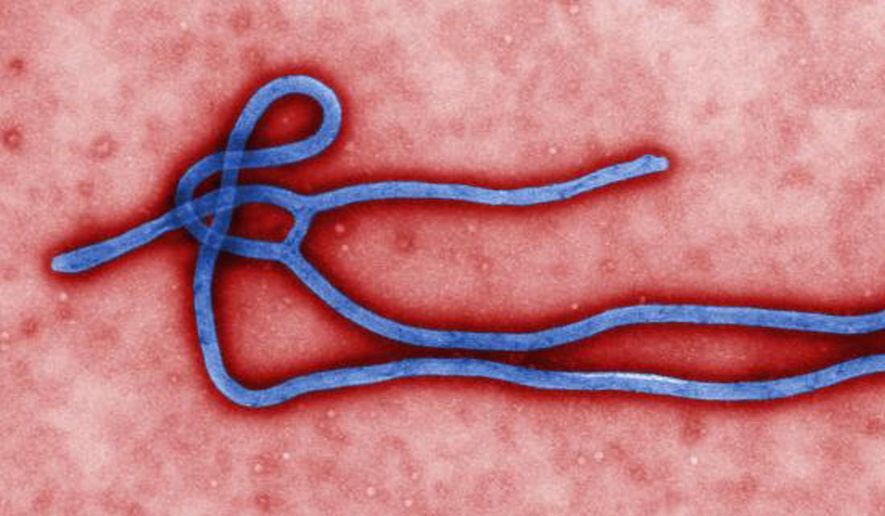Liberian Thomas Eric Duncan, the first Ebola patient diagnosed in the U.S., died Wednesday in a Dallas hospital, and hours later the Obama administration announced belated plans to screen airline passengers from West Africa at five U.S. airports for symptoms of the deadly virus.
As officials reported a second possible Ebola patient in suburban Dallas, a sheriff’s deputy who had contact with Mr. Duncan’s family members, the Obama administration announced U.S. authorities will begin heightened screening of passengers at major airports handling 94 percent of all travelers coming from the Ebola-wracked nations of Liberia, Sierra Leone and Guinea. This includes Washington Dulles International Airport.
Mr. Duncan was pronounced dead at Texas Health Presbyterian Hospital, where he was admitted Sept. 28 and had been kept in isolation while receiving experimental treatments. Mr. Duncan, called “patient zero” in a reference to the man believed to have helped spread the AIDS epidemic in the U.S. in the 1980s, showed no signs of the illness when he arrived in Dallas Sept. 20.
The death should serve as a reminder to all Americans “what a deadly enemy Ebola is,” said Dr. Thomas Frieden, director of the Centers for Disease Control and Prevention in Atlanta. The virus has killed more than 3,700 people in West Africa, where it is still spreading out of control.
The Texas Department of State Health Services said Mr. Duncan’s body will be cremated; corpses with Ebola are still contagious.
“He fought courageously in this battle,” the hospital said Wednesday in a statement.
Mr. Duncan first visited the hospital’s emergency room on Sept. 25, complaining of fever and abdominal pain. But for reasons that remain unclear, hospital staff sent him home in spite of his informing them that he had traveled from Liberia.
President Obama held a conference call from the Oval Office Wednesday with state and local officials about Ebola, in what appeared to be an attempt by the White House to reassure the public. The president said of Mr. Duncan, “Our thoughts today are with his family.”
“As we saw in Dallas, we don’t have a lot of margin for error,” Mr. Obama told the officials. “If we don’t follow protocols and procedures that are put in place, then we’re putting folks in our communities at risk.”
The president said the additional airport screening measures “are really just belt-and-suspenders — it’s an added layer of protection on top of the procedures already in place at several airports.”
The other airports selected for heightened screening are Newark Liberty International Airport in New Jersey, Chicago’s O’Hare International Airport, JFK in New York and Atlanta’s Hartsfield-Jackson International Airport. Up to 150 travelers per day from Liberia, Sierra Leone and Guinea will be escorted by Border Protection agents to screening areas at those airports, where they will be questioned and have their temperatures taken by medical personnel using “noncontact” thermometers.
But officials acknowledged that the screening might not catch all infected travelers, because Ebola patients often don’t show symptoms, such as a fever, for up to 21 days after exposure to the disease. And there are new questions being raised about the effectiveness of noncontact thermometers, although Dr. Frieden said the devices “give a reliable result.”
The Obama administration has been under pressure for months — as the death toll rose in West Africa — to increase passenger screening or ban travel from the affected countries. Sen. Jerry Moran, Kansas Republican and ranking member of the Senate Appropriations health subcommittee, said the extra screenings announced Wednesday “are not the full solution.”
“Given Ebola’s long incubation period, entry screenings are not the full solution, but this is a step in the right direction,” Mr. Moran said. “As we work to fight Ebola abroad, we also must make certain our homeland is protected.”
Sen. Charles E. Schumer, New York Democrat, said the additional steps “will provide another necessary line of defense against this epidemic.”
“When it comes to Ebola, you can’t be too careful,” Mr. Schumer said. “As we saw in Dallas, all it takes is one case to discombobulate an entire city.”
Others in Dallas still are being monitored as health officials try to contain the virus. They are also trying to tamp down anxiety among residents frightened of contracting Ebola, as the disease can be spread only through direct contact with the bodily fluids of an already sick person.
Health officials have identified 10 people, including seven health workers, who had direct contact with Mr. Duncan while he was contagious. Another 38 people also may have come into contact with him.
Suburban Dallas officials say a Dallas County sheriff’s deputy who had gone into the apartment where Mr. Duncan had stayed is hospitalized after falling ill. Frisco Fire Chief Mark Piland says the deputy is being treated “out of an abundance of caution.”
Emergency responders in the Dallas suburb took the deputy to the hospital after an urgent care facility reported a patient “exhibiting signs and symptoms” of Ebola claimed to have had contact with the man diagnosed with the disease in Dallas.
State health officials say there’s no indication the person had any direct contact with Mr. Duncan.
Chief Piland says the deputy entered the apartment where Mr. Duncan had been staying and had contact with some members of the family Mr. Duncan stayed with.
Mr. Obama also met Wednesday with top military officials at the Pentagon, where they discussed the efforts of some 4,000 U.S. military personnel that the president has deployed to West Africa to fight the epidemic by building treatment centers and transporting health care workers.
The president said the effort is being carried out “in a way that ensures our men and women in uniform are safe.”
• Dave Boyer can be reached at dboyer@washingtontimes.com.




Please read our comment policy before commenting.